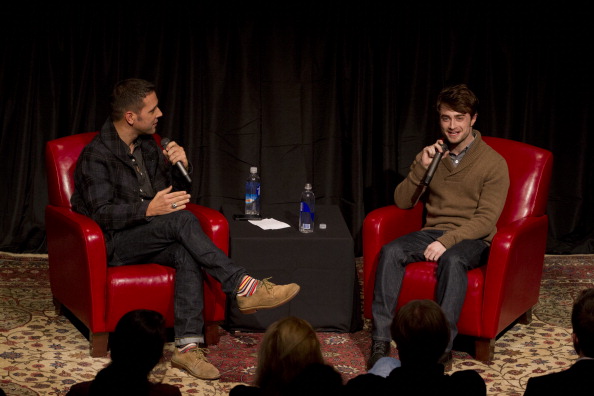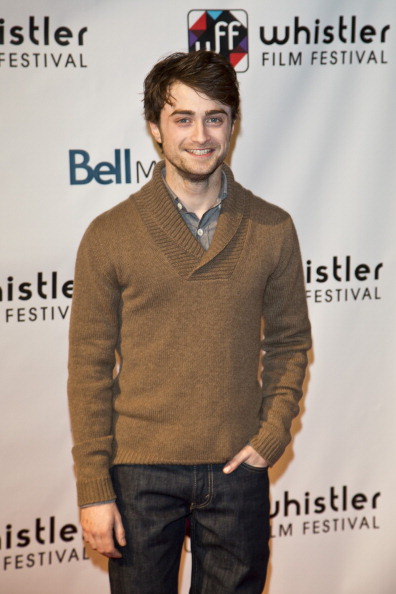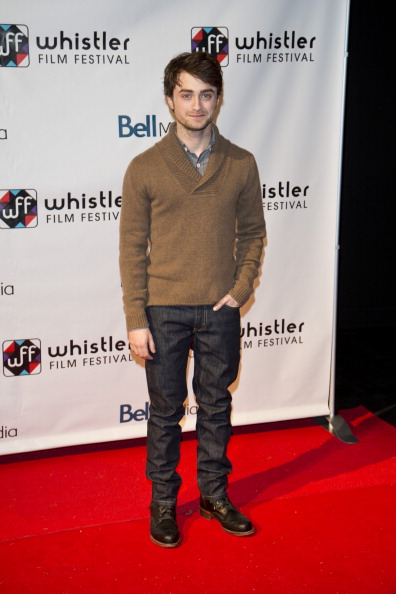 Daniel Radcliffe attends Whistler Film Festival, talks Harry Potter, upcoming films Daniel Radcliffe attends Whistler Film Festival, talks Harry Potter, upcoming films
Daniel Radcliffe was one of the spotlight panels at this year's Whistler Film Festival, near Vancouver in Canada, and participated in a question and answer session Friday evening with George Stroumboulopoulos.
Photos of the Harry Potter actor on the arrivals red carpet can be seen below; highlights and quotes on Dan working on his various projects in the past few years, via the Vancouver Sun, are here. 


 On his feature Horns:
Daniel Radcliffe: It's about a guy who wakes up one morning to discover he has a pair of horns growing out of his head. His girlfriend has been murdered, and the entire town thinks that he's done, it. And one day he wakes up with this. In the first part of the movie he uses the horns to make people confess bizarre desires and truths, and he then uses them to find out who actually killed his girlfriend. It has elements of horror.
It's also one of the most beautiful love stories I've ever read. It's very violent, and really funny, and it's great. People are so keen to put a film into a genre -- that's the easiest way to market it. And I'm sure when Horns is coming out, you'll see it marked as a horror, or whatever it is. But it's so many things. And the harder a film is to define, the better it probably is.
On filming The Woman in Black:
Dan: I certainly wasn't saying it at the time, but yeah, I think it was crucial. I didn't want to do all the press for that film saying, 'really, this is a very important film for me, and if it doesn't do well, I will be very, very worried.' But yeah, if that film had done nothing, I would have been devastated, and really concerned. . . . So I was very pleased when that film did well.
But I have to say, I did also smile a small smile when I heard that it was the most complained-about film ever, to the censorship commission. I did go around the whole way saying, 'if you have kids under 12, don't take them.' It is really a scary movie. And -- they took them anyway. Those kids were scared.
The end of Harry Potter:
Dan: I think you get to a stage where you've grown as much as you can within one environment. And despite being surrounded by people I love, and people I see a lot, sometimes you need to be in a room full of strangers, and have that moment of going, 'I don't know anybody here.' I always think of myself as being really good at being on set, and being as much part of the crew as part of the cast.
And then I realized that I had always done that with Potter, but then, I had grown up with that crew, so of course that was going to be the case. And I was really worried about whether I'd be able to have the same kind of familiarity with a new crew. It's about giving yourself every opportunity to fail, and hoping you don't.
On filming Kill Your Darlings and portraying Allen Ginsberg:
Dan: It's fun. The script is not reverent. It doesn't hold these men up as the venerable greats of American literature. It shows them as the kind of drug-addled miscreants that they were in the 1940s when they first met. It's not just going to be just a dry, historical recounting of events . . . I hope it's going to be a very beautiful, very sad story about love, and what it means to be an artist.
Kill Your Darlings is like no film I've ever made before . . . It's got a lot of lines in the script that most actors would tell you they hate. It's like: 'Alan weeps uncontrollably.' And I'm like: 'Well, maybe I would. Let's see how it goes.' Unless you have that trick of being able to cry on cue, which some people can do, the more you try to force it, the more awkward and awful it becomes. As I have found!
Three, uncontrollable, breaking-down scenes later, like, three times within the first few weeks of filming . . . there were these real, raw tears. The first time that happens to you on a set, full of people . . . Even if you go in just as that character, at that moment, it is just you. Gary Oldman said to me once, 'Don't be afraid to use all your own stuff, because they're only going to see it happening to the character.'
On shooting A Young Doctor's Notebook:
Dan: During the summer, I did a mini-series with Jon Hamm, based on a book called on A Country Doctor's Notebook, by an author called Mikhail Bulgakov, and it's all about his own experiences as a young doctor being posted to the middle of nowhere in Russia while the Russian Revolution is going on.
I think it's probably the only TV series set in Russia in 1917 that features nothing about the Russian Revolution. At one point I get a letter from my friend telling me about these amazing, exciting moments of political change, and [my character is] just stuck in these backwoods. It's basically a comedy about isolation and loneliness, and morphine and syphilis.
Through this career, when most boys are moving away from their dad, you actually got a chance to spend time with your dad.
Dan: Yeah, and that has its advantages and disadvantages. When you're as alike as me and my dad are - and we are incredibly alike - and you spend every day together, you can really rub each other up the wrong way. So towards the end of Potter, there was certainly a feeling that we wanted our own space. But I do feel that Potter really bonded us very closely as a family. I was really lucky that they [my parents] were both in the industry and could tell me how to be on set, and what to do, and what not to do. We are a great team, as well as a great family.
I think they must have been very aware of the risks, because they turned it [Harry Potter] down initially. They were asked to let me audition for Potter when the deal was to sign on for six films, all of which would be filmed in LA. My mum and dad both said that no, that would be way too disruptive to his life. So I suppose they knew that there were risks, but I think they trusted themselves enough as parents to be able to go, 'we can make this a good experience'. When we signed on, we signed on for two films. Particularly in those first four or five years, they would ask me all the time: 'Are you happy? Are you having a good time?'
On being in the public eye, removing himself from privacy:
Dan: To me, that's not a valid argument. If you have gone out of your way to seek the attention of the press, then that's a valid argument. But that's not what I do, or have ever done. Obviously, I come here, and I talk to you, and I give interviews, and there's a certain amount of press work that goes along with my job. But I think that's different from someone who actively courts media.
For the first six years, the press really left us alone. Then, as me and Rupert and Emma, one by one turned sixteen, there was definitely [more press attention]. Poor Emma, when she turned eighteen, then the paparazzi just became criminals, in my view. In what other context could five men chase a woman down an alley, and it be ok?
In terms of keeping my life private, I think at times I have been far too open about things. But you learn. There is no clear way to do this. As you go on, you give interviews, and you learn how much you want to keep to yourself. How much of your own sanity you need to keep to yourself. You just have to learn as you go, what is the way of handling those things that makes you the happiest and most content in your own life.
 |